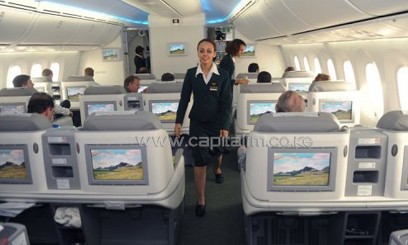
A hostess in a dreamliner/FILE
TOKYO, Apr 30 – Executives at Japan’s two biggest airlines said Tuesday they were relieved the troubled Boeing Dreamliner was taking to the skies again, as the US planemaker ran full-page ads in major Japanese newspapers to apologise for the crisis.
Japan Airlines (JAL) said it was “trying to minimise” the financial impact from the three-month grounding of Boeing’s Dreamliner owing to problems with its lithium-ion batteries, but said its results were also stung by rising competition and soaring oil prices.
“The three-month period was long, but I am relieved that there were no major troubles during that time so we could save customers’ trust in us,” said JAL president Yoshiharu Ueki.
Rival All Nippon Airways (ANA), which operates 17 of the Dreamliner’s 50-strong global fleet, said its fiscal year net profit soared 53.1 percent, as cost-cutting and a boost in demand for international travel helped it shrug off its Dreamliner woes.
Together, the carriers said their sales would take a hit of over $200 million in the past and current fiscal year owing to the Dreamliner grounding, though ANA said the pain would be lessened if it can restart flights by June as the next-generation aircraft undergoes a battery fix.
“We also responded flexibly to minimise the number of cancellations affected by the groundings of the Boeing 787 from January, minimising its impact to profit,” said ANA Chief Executive Shinichiro Ito, who flew in a Dreamliner test flight Sunday with a top Boeing executive.
ANA has said it would seek compensation from Boeing.
The carrier, which flew the Dreamliner’s maiden flight, and rival JAL together account for half of the Dreamliners in service globally and had to cancel thousands of flights in the wake of the crisis.
The fleet was grounded in January after a number of incidents including a fire on a JAL plane in Boston, and an emergency landing on an ANA flight in Japan.
After months of investigations into the plane’s powerpacks, US authorities on Thursday issued formal approval of Boeing’s battery fix, followed by a similar move by Japanese regulators.
Ethiopian Airlines on Saturday become the first carrier to start using the aircraft again, while ANA ran its test flight the following day.
But it could still be at least a month before the whole Dreamliner fleet is back in the air.
“We deeply apologise to Japanese customers and companies affected for the trouble and concern caused by our new Boeing 787,” the US firm said in an advertisement that appeared in major Japanese newspapers Tuesday.
JAL, which re-listed in Tokyo last year after a high-profile bankruptcy restructuring, said its net profit in the fiscal year to March fell 8.0 percent to 171.7 billion yen ($1.8 billion), while it slashed its full-year earnings outlook by almost a third to 118 billion yen.
Sales rose 2.8 percent to 1.24 trillion yen in the 12 months to the end of March, it added.
ANA meanwhile said it earned 43.1 billion yen in the year to March, up from 28.2 billion yen a year earlier, as sales climbed 5.1 percent to 1.48 trillion yen.
It said it expected to earn a 45.0 billion yen net profit in the current fiscal year.
A weaker yen, which has helped Japan’s exporters, had a less positive impact for the airlines whose fuel costs are priced in dollars.
The Japanese currency has declined steeply in recent months as Prime Minister Shinzo Abe and his hand-picked team at the Bank of Japan roll out a big spending and aggressive monetary easing agenda, dubbed “Abenomics”, aimed at stoking the world’s third-largest economy.
“Fuel costs have risen nearly 20 percent,” JAL’s Ueki said.
“But the original purpose of Abenomics is to boost demand… including tourism, so in the mid-to-longer term, its impact is a plus.”
Japanese airlines have also been hit by a row between Tokyo and Beijing over sovereignty of a group of islands in the East China Sea, which triggered anti-Japan rallies across China and a consumer boycott of Japanese brands.


































